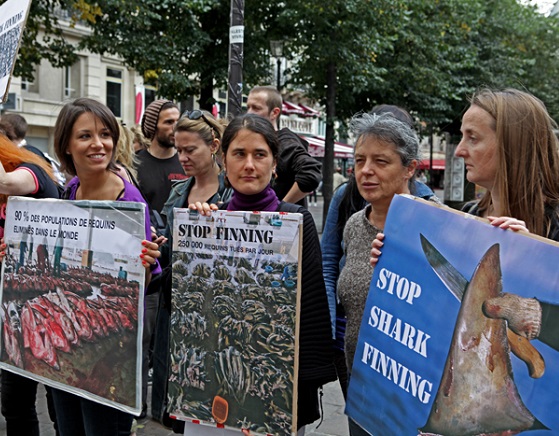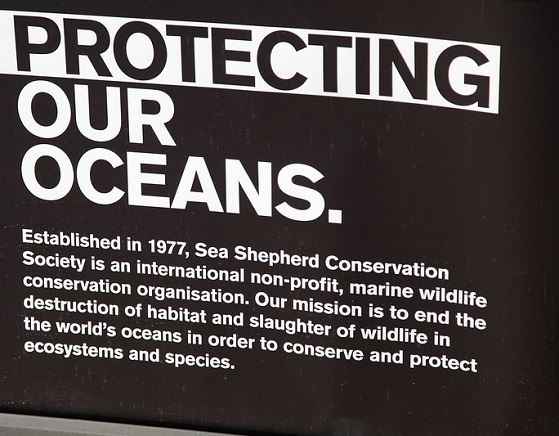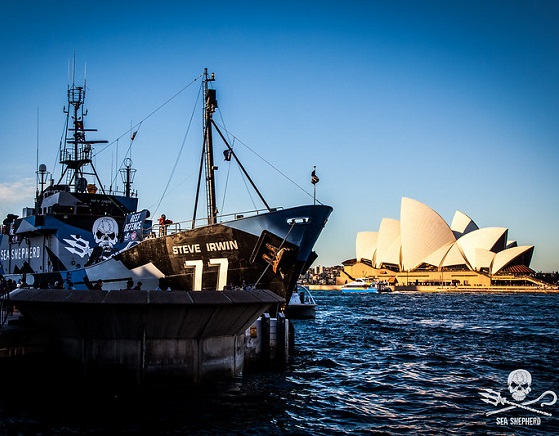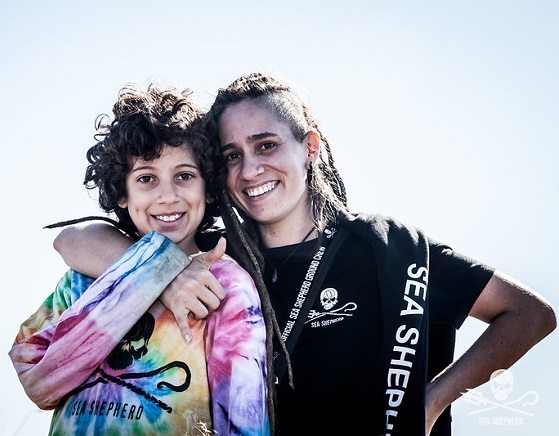Feel Injustice With All Your Senses in Order to Know.

{source}
We Need to Experience in Order to Know: What Being an Activist Taught Me About Seeing Suffering With My Own Eyes.
Sometimes in life, you find yourself in a moment in which you see everything from above, bird’s eye view, and in all its absurdity the world reveals itself to you. Sometimes in life, you also come to places where the threads of the unimaginable structure humankind has created come together and hit you in the face as solidly as a rock.
Both of the above scenarios occurred to me not long ago, on a summer day in the port of Mindelo, Cape Verde. I was working for the ocean conservation organization Sea Shepherd Global at the time, and after a couple of months of campaigning in The Gambia, we stopped over in Sao Vicente to take a short break and re-stock.

{source}
One windy morning I stepped outside to take a walk, some crew members had said that the biggest fishing trawler of West Africa, the Spanish-flagged Pacific Star, had docked the night before to unload its catch. When I saw the massive purse seiner, I could not believe my eyes. As a not very experienced sailor, the ship seemed like a monster to me: 110 meters long, 4100 tons heavy and more than 40 crew members.
Over the course of two days, it was unloading 2,000 tons of tuna. 2,000 tons of tuna! My first thought, how many lives are that? I didn’t know. In massive nets they lifted the frozen fish, scoop after scoop, out of the ship’s belly and into containers that were going to be shipped to Europe or wherever the market paid the most for it. That was their catch for only one fishing trip.
Caught in my own thoughts and shock, I started to wander, and suddenly realized what else was taking place around me. All of a sudden, it felt like a scripted scene in the Devil’s deadly theater.
Behind the Pacific Star, the dock was lined with mid-sized fishing vessels unloading tons and tons of sharks. Or let’s say, the corpses of sharks whose fins had already been cut off: a commodity with immense value on the global market. Shark finning is still legal in Cape Verde, so one could say, at least they didn’t discard the sharks’ bodies back into the oceans: the usual procedure in the shark finning business.
Walking past the fishermen operating the cranes and sorting the carcasses, I looked into their eyes, trying to find a glimpse of emotion that showed they are aware of what they are dealing with. But no, all I saw was smirking faces whistling as I walked past.
At the end of the dock, I saw a cluster of elderly people slowly making their way out of the port, and as I looked up, I spotted a gigantic cruise liner. Ironic, I thought, probably they had tuna for dinner last night, which had been shipped around the world to land on their plates. Now they come back to the source of their culinary pleasures, unwarily consuming while exploring the world with blinds on their eyes.
They did not even look up — their walking sticks on paved roads needed all attention.
Back at our ship, I noticed another vessel had arrived — a huge cargo ship that contained… cattle.
So, you know how there is global trade with beef, hauled from Brazil to Germany, from India to Japan? And how you would think that it’s actually dead meat they ship all around the globe? Well, no.
They were living cows freighted over the Atlantic, penned like sardines in the tin, no space to turn around, traveling from Argentina to Cape Verde, from Cape Verde to Spain, straight to our plates — what delicious Amazonian steak that is. The cows poked their heads out of tiny windows to breathe some fresh air and the sheer desperation in their eyes flew like stinging pins right into my heart.
Do cows get seasick? Are they repelled by the smell of their excretions, like we’re repelled by our own? Do they have space to lie down and have a rest? What does their fear feel like? I looked into a snow globe containing our planet — what have we done?

{source}
Spending months out at sea investigating illegal fishing activities, we witness the tough reality of the global fishing industry every day. We experience crimes against the environment, animals as well as humans, as we observe how the slaughter of marine wildlife and the destruction of their habitat is accompanied by the severe abuse of human and labor rights.
The fishermen working on some of these vessels are exploited by far-flung fishing companies that are driven by profits only. Thanks to a system of trans-shipment that allows them to refuel and unload catch out on the open ocean, some of them stay offshore for over a year.
The living conditions on board are often horrendous, including terrible sanitary conditions and a lack of medical support, not to mention racial harassment and segregation. All of this happens because of our immense hunger for fish, our perverse tendency to make life a commodity, and the human hubris to subdue nature.
Now, we hear and read a lot about all sorts of terrible things everywhere on the planet, and the more we hear or read, the more we numb ourselves down. It makes sense, I get it, we want to protect our own well-being, our sanity really. But it’s just the opposite of what we need to do in order to incent actual change of behavior.
I think that the discordance between awareness and action lies in the lack of direct experience (or at least direct confrontation). We need to get back into a feeling mode of existence, we need to let ourselves be touched, even if that means being touched by the pain and suffering of others, so that when we speak about human rights abuse on a fishing vessel, we really know what it entails.
We visualize the Senegalese father of three, husband and son, who works 14 hours a day, washes himself in the same square meter of shower that he also uses to take a shit, who at night crawls into a space between the engine room and the bridge wing that’s not even high enough to sit up straight, and tries to get a few hours of sleep between 15 other fishermen and a myriad cockroaches.
Most of our political debate is carried by categories and completely alienated from the very subject it discusses.
While still subsidizing the meat industry and global fishing operations, we’re loosely weighing profitability against species-appropriate husbandry, job security against environmental protection, economic development against sustainable supply chains. All of them concepts that are vague and empty husks, and conceal a tangible actuality that most of us struggle to grasp, either with the mind or with the heart.
If we had the courage to really look at and acknowledge the rough reality of the meat and fishing business, the fact that it entails the torture and slaughter of millions of beings, the enslavement of developing countries and the abuse of nature, our priorities might shift very quickly. But we have ceased to see the roots and repercussions of our actions, as they have been outsourced to lawless places far away.
If we looked into the eyes of someone who had to flee their country due to war, and if we listened to their story, would we forget all our fears and sorrows, our greed and patriotism?
If we saw with our own eyes how thousands of tons of fish are stolen out of the ocean, how sharks and dolphins and whales fight for their lives entangled in nets or impaled by hooks, how ecosystems collapse and cows cry for their babies, would our political and personal decisions look differently?
We consciously or unconsciously avoid this face-off continuously.
And it’s true, the direct confrontation with these realities is rather difficult with them taking place out of sight and far away. But we are even afraid to look at images or videos of the suffering that happens all over the world. Because it could actually touch us at the very core, because it reflects ourselves and our own lives, because it hurts to see other beings being hurt.
When you open your heart to feel with others, it hurts so much that there is no other way than changing your behavior and becoming active. The moment you see something with your own eyes and you feel injustice with all your senses, you cross an inner border, and you know you can’t go back from there. Something abstract becomes concrete, a hunch turns into certitude.
I’ve always been a person of strong ideals. I was beholden to the idea that I can figure things out in my mind, that my convictions are strong enough to drive my actions. That I can find wisdom and knowledge through immersing in books, through philosophical discussions and intellectual exchange. And I’m not saying that this is insignificant.
I do believe that the mental and theoretical reflection of life and the world has the power to lead you into the right direction. But only the immediate experience of reality leads to true knowledge, to an understanding of truth and to an intuitional sense of right and wrong that inhabits your body, your heart, your mind and your soul… irreversibly.

{source}
***
Nina Hoelzl is a documentary filmmaker and Sea Shepherd activist based in Berlin and traveling worldwide to seek stories and lend her voice to those, who struggle to be heard. Inspired by nature, encouraged by spiritual wisdom and interested in truthful human encounter she tries to creatively navigate through a world of contradictions on the outside and within.
***
{Join us on Facebook, Twitter, Instagram & Pinterest}
Comments
Comments are closed.



Heal the Shadow of the Inner Mother Within. | Rebelle Society
January 20, 2020 at 7:01 am[…] What good is any of our work if we are still so intolerant of our own humanity? […]